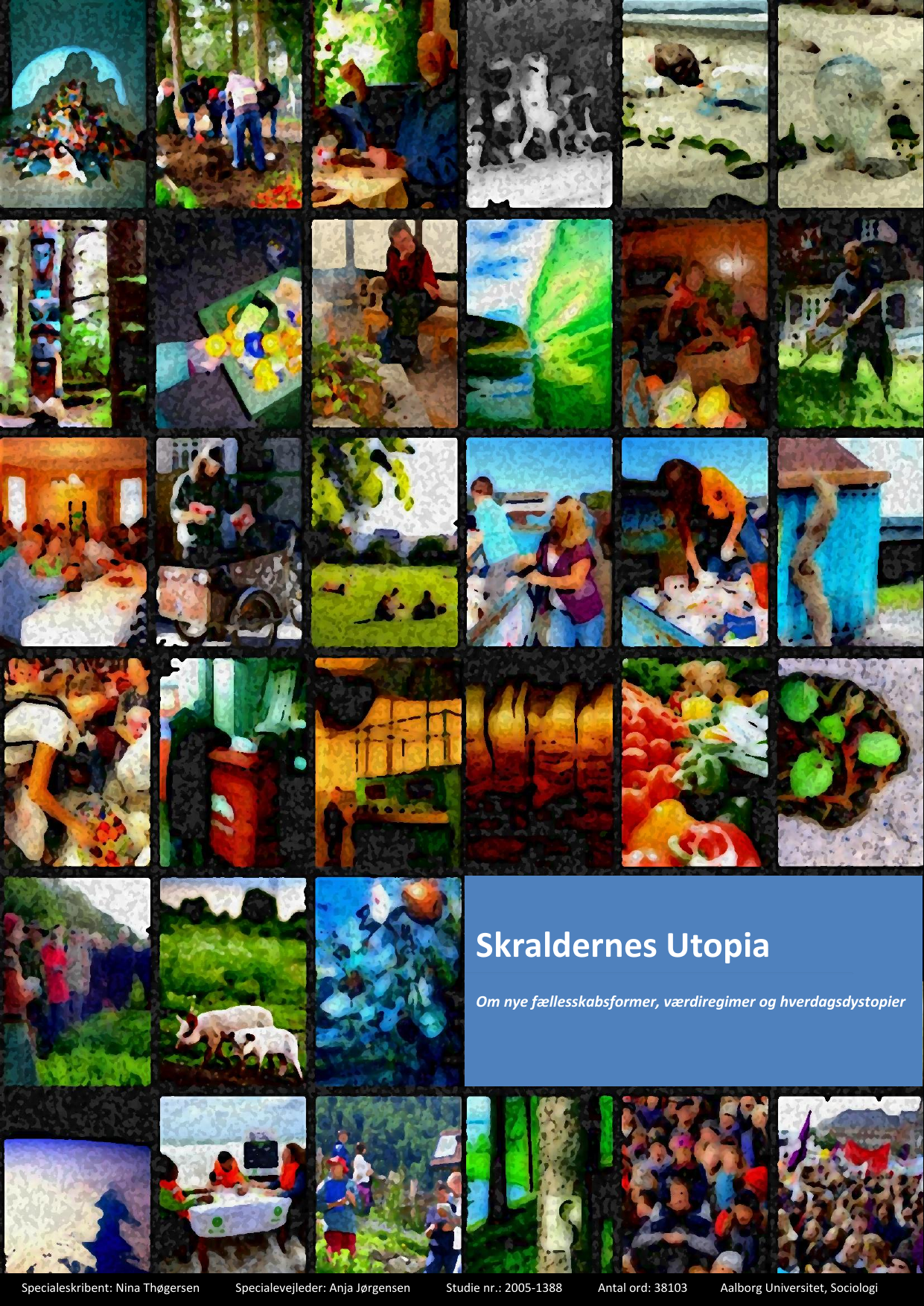
Skraldernes Utopia: om nye fællesskaber, værdiregimer og hverdagsdystopier
Oversat titel
The Utopia of Dumpsterdivers
Forfatter
Semester
4. semester
Uddannelse
Udgivelsesår
2011
Afleveret
2012-01-18
Antal sider
89
Abstract
Indeværende speciale omhandler fænomenet skraldere, ud fra tesen at skralderne kan ses som en modstandskultur med iboende elementer fra en eventuel emergerende værdiforandring. Informanternes handling og motivation som ideologi kan ses som en reaktion på problematikker, såsom sult, en ulige fordeling af ressourcer og et overdimensioneret fokus på standardiserede, pæne varer. I specialet undersøges derfor skraldernes motivationer, hverdagsforståelser og utopier. Der testes desuden hvorvidt skraldernetværket kan ses som en ny form for fællesskab på linie med Michel Maffesolis stammefællesskaber. Skralderne færdes som udgangspunkt i små, lokale skraldegrupper, men udveksler erfaringer, tricks og hemmeligheder gennem det store skraldenetværks kanaler, de sociale medier, og via interpersonelle sociale netværk. En del af skraldernes kultur omhandler desuden en genforelsken sig i verden og en genvækkelse af den sociale ansvarlighed. De ønsker små, nære fællesskaber, hvor individerne tager vare på hinanden og en decideret afinstitutionalisering.
Dumpsterdivers are known throughout the world society by their curious habit of picking trash from the supermarket dumpsters. Who are the dumpsterdivers and what are their background and reasons for endeavoring in such a deviant action? Studies shows that dumpsterdivers are often young students between 20-30, who spice up their income by dumpsterdiving. But why choose this ‘line of work’, when they could be earning money in much less tabooed ways? Could they be considered as a preview for a general value change in the society or a new form of sociality? Is the society going green with a modern grassroots organization twist? This thesis uses Danish dumpsterdivers in its main research question: Is it possible to find evidence of an emerging value change and new forms of communities in Denmark, through the youth phenomena dumpsterdivers and their action, motivations, utopias and organization? The thesis is based on an empirical study commenced in 2009 and finished in 2011. Based on observations from the field and interviews with 9 different dumpsterdivers, I analyze the dumpsterdivers background and motivations in order to draw four different typologies or ideals. It turns out that the dumpsterdivers main motivations are ideology, economy and community. There is no such thing as a pure motive - on the contrary, the motivations are mishmashed in a bricolage, with submotives. After considering the motivations, the reasons to act, I take a look at the youth’s organization and analyze the different aspects using neotribe-theory of Michel Maffesoli. It turns out that the dumpsterdivers everyday lives are centered around small, localized ‘diver-groups’, while their network is based mainly on interaction through social medias and secondly on pier to pier interrelations throughout the nation. What holds the groups together is their previous relationship and knowledge of each other. What holds the community together is a common goal and a collective feeling of being on the right path. Subsequent ‘social glue’ is the action itself, which commands secrecy and discretion and by the network is considered as a fun and exciting way of hanging out for youths in their 20’ies – and still makes sense, which is an essential ingredient in our time. As Maffesoli puts it: It is a time of social empathy, effervescence and world enchantment. The reasons for dumpsterdiving might belong to a specific kind of collective justification: the civil world or the green justification system. In the civil world all actions and ideals must have a collective offset, all justifications refers to the common good. The lowest actions are based on pure egocentric reasons, as we find in the dumpsterdivers community, where it is a sin to be greedy and a virtue to share your findings with others. Dumpsterdivers oppose the market world, with its focus on profit, highest value and opportunism. They rebel against the market world’s dismissive attitude towards trash and the consumerism itself by taking dead things from their resting place and starting an entirely new discourse about such places of decay. Meanwhile, the youth’s utopian mindset can be connected to a special kind of utopian impulse: the need to create a better community, using your everyday life as a starting point. The dumpsterdivers all explain to me the wish for their action to make a difference in the accumulation of trash in Denmark. If they trashhunt grocery instead of buying it, at least they do not accumulate more CO2, but reduce it. The dumpsterdiving Utopia is based on a need for smaller communities, more social responsibility and a closer relationship with the production of food. The utopian wish can be considered as a kind of diagnose of a dysfunctional society, where resources are wasted and the city is colored in gray and gray. Many of the utopian elements from the dumpsterdivers version of utopia, resembles classic utopias as The Garden of Eden and The Happy Village Life, but reformed and transformed in a modern sense, with fragments of the need for deeper relations in the fast tracked city and as a response to ‘the shallow life’.
